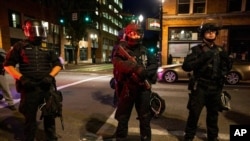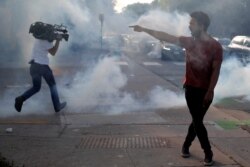At least 117 journalists have been detained or arrested while covering protests across the U.S. in 2020, according to a report released Monday by the U.S. Press Freedom Tracker, a collaborative project of two leading press advocacy organizations.
The report, which covers cases up to December 10, shows an unprecedented number of reporters, photographers and news crews detained while covering protests in about 40 U.S. cities. The arrests in 2020 amount to more than double what the Tracker recorded in 2017, 2018 and 2019 combined — and it is still verifying cases.
"The number is unlike what we've seen in the Tracker's entire history," said Kirstin McCudden, managing editor of the project. "This year we've seen just an unprecedented amount of protests across the nation. And protests have always been an incredibly dangerous place for journalists compared to other beats."
In 2019, the Tracker documented nine cases of journalists detained. But arrests aren't the only press freedom intrusions to have increased in 2020. By mid-December, the Tracker's researchers were working to verify more than 1,000 incidents, including physical attacks, border stops and subpoenas. Last year, the team recorded a total of 152 violations.
"It is really amazing what journalism has gone through this year, from the pandemic, from being furloughed through covering some of the hardest stories, certainly in modern times, certainly in the decade," McCudden said.
Journalists play an important role during events like protests, Vera Eidelman, staff attorney with the American Civil Liberties Union's Speech, Privacy, and Technology project, told VOA.
"People who are engaging in these press functions are our eyes and our ears and, thanks to their cameras and phones, they're able to tell us about what is happening on the ground, including in a time where we're in a global pandemic and people aren't necessarily able to be physically present," Eidelman said.
The Tracker's report highlights several cases of journalists who were detained or injured during the protests, including freelancer Robert Spangle, who says he repeatedly called out to police that he was a journalist and asked what they wanted him to do as officers encircled him and a group of protesters. Spangle, who was reporting in Los Angeles and wearing a helmet marked "Press," told the Tracker several police ignored him, until finally officers zip-tied his wrists and sent him to a bus with other protesters detained for allegedly breaking a curfew. He was later released.
The U.S. Press Freedom Tracker has a vigorous verification process when documenting cases, including determining if the targeted person was working as a journalist, and for cases involving law enforcement, contacting the police department involved.
In most cases, McCudden said, the project's investigators received no comment, or authorities said they were unable to respond because of possible lawsuits.
In statements about the U.S. protests, the International Association of Chiefs of Police (IACP), a professional organization for police leaders, has said it is committed to the safety of communities. The IACP did not respond to VOA's emails seeking comment.
Better communication is needed between police and the press, McCudden said. During protests, cities imposed curfew orders that exempted news media, but journalists still were detained for allegedly breaking those regulations. Others were caught in a police tactic known as kettling, where officers surround a group and block exits before making arrests.
In the heat of the moment, it can be difficult to tell who is a journalist or a protester, said Eidelman, of the ACLU. "I think sometimes it is just an overbroad assumption of authority and a problematic view of what is a proper response, even when it is clear that someone is simply exercising their First Amendment rights," she said.
In several cases, journalists cited by the Tracker say they identified themselves to authorities as press, but it made no difference.
Several arrests were captured on video and shared on social media, including that of KPCC public radio reporter Josie Huang in Los Angeles, who is seen being pushed to the ground by police as she yells out that she is a journalist. Huang was detained for five hours and cited for obstructing police, the Tracker says. The charges were later dropped.
In Portland, independent journalist Grace Morgan told the Tracker federal agents pushed her to the ground while she was covering a protest in Portland, Oregon, and an agent sprayed mace in her face. While in custody, she said agents forcefully pushed her head into a wall. She was later released and told there would be no charges.
Over 40 reported being assaulted and arrested covering protests across the U.S.
In Portland, Oregon, the location of some of the most intense protests, the Tracker documented several cases of journalists like Morgan being beaten, tear-gassed, pepper-sprayed or hit by projectiles like rubber bullets.
The ACLU in Oregon sued to block police from dispersing, arresting or using force on journalists.
"We have filed lawsuits, including in Portland and in Minneapolis, challenging the unlawful arrests and the use of excessive force against journalists," Eidelman said. "I think, as with the protests and protesters more broadly, there is some assertion that it is more important to protect property or more important to enforce 'law and order,' than it is to allow people to exercise their First Amendment rights safely."
While most journalists are released quickly, at least 16 still face charges, including several freelancers who often lack the access to legal resources that major media organizations have.
The first arrest documented by the Tracker took place on live TV when police in Minneapolis detained CNN reporter Oscar Jimenez and his news crew on May 29. Minnesota Governor Tim Waltz later apologized for the arrest, saying, "We have to create the space for you to tell the story."
High-profile arrests like that of Jimenez helped shed light on the issue. But McCudden said, "Most days, it is an independent journalist, it is smaller outlets, and they don't have the national recognition. They probably don't have legal teams working for them immediately."
By collecting data, the Tracker provides information for lawmakers and newsrooms on issues of journalist safety, McCudden said.





